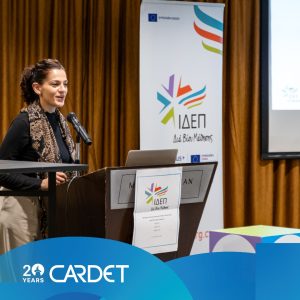Partner UP Project Highlighted at “Bridging the Gap Between Higher Education and VET with Industry” Conference

On December 5th, Dr. Xanthia Aristidou, Senior Project Manager and Researcher at CARDET, delivered a presentation at the “Bridging the Gap Between Higher Education and VET with Industry” Conference, organized by the Foundation for the Management of European Lifelong Learning Programmes (National Agency for Erasmus+ Cyprus). The event, held in Limassol from December 3-5, brought together stakeholders from education, vocational training, and industry to explore collaborative solutions for workforce development.
Dr. Aristidou’s presentation, titled “Upskilling and Re-skilling the Workforce: The Role of Universities and Adult Education Providers,” highlighted the Partner UP project, a key Erasmus+ initiative aimed at enhancing the implementation of Upskilling Pathways for adult learners. This project plays a crucial role in CARDET’s broader efforts to bridge the gap between education and industry, while aligning with the Renewed Agenda for Adult Learning and contributing to European strategies for lifelong learning.
The Partner UP project focuses on increasing adult learners’ participation in lifelong learning, reinforcing the Upskilling Pathways Recommendation, and promoting cross-sector collaboration to address skill gaps in key sectors. By fostering this collaboration, Partner UP directly supports the European Skills Agenda and the overall vision for resilient workforce development.
Upskilling and reskilling are critical for adapting to technological advancements and enhancing workforce flexibility. Universities and adult education providers, through initiatives like Partner UP, align their curricula with industry needs, offer lifelong learning opportunities, and create pathways for workers to upgrade their skills in key sectors. This collaboration ensures that learners are equipped with the skills necessary for a rapidly evolving job market.
The project also addresses key challenges, such as a lack of basic skills in adults, limited career guidance services, and the absence of national monitoring systems for adult education. It highlights the need for transparent cooperation mechanisms and tools to facilitate communication and coordination among stakeholders, aligning with Cyprus’s Lifelong Learning Strategy to build a more inclusive, skilled workforce.
Dr. Aristidou’s presentation also underscored CARDET’s other contributions in adult education and lifelong learning, demonstrating how multiple projects intersect to foster inclusive, skills-driven development. For example, RALExILA focuses on building national registries for adult learning, JUST4ALL promotes a just transition through inclusive lifelong learning, and ADULTDIGITALUP enhances digital skills across Cyprus. These initiatives reinforce CARDET’s commitment to fostering innovation in lifelong learning and supporting policies that empower adult learners.
CARDET’s leadership in adult education and lifelong learning is demonstrated through its ongoing work to drive collaboration, advance European policies, and implement projects that equip individuals with the skills they need to thrive in a dynamic, technology-driven world.

